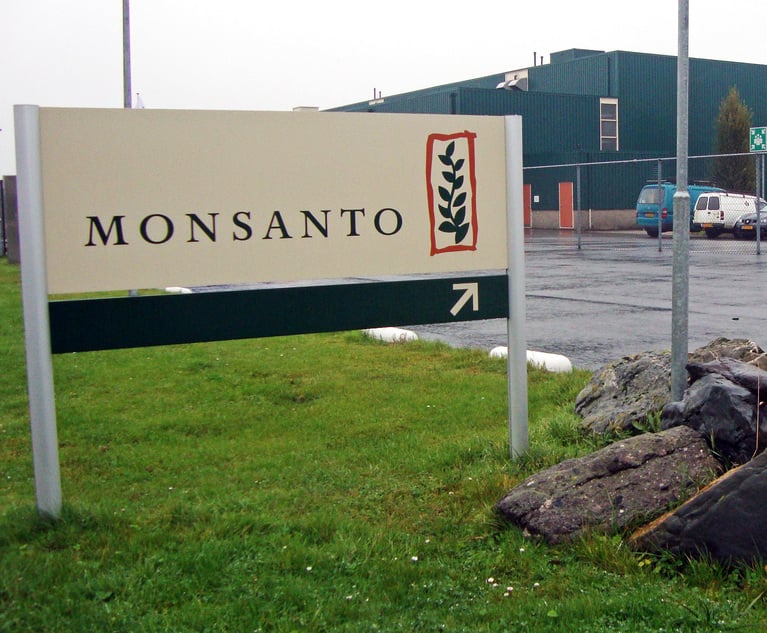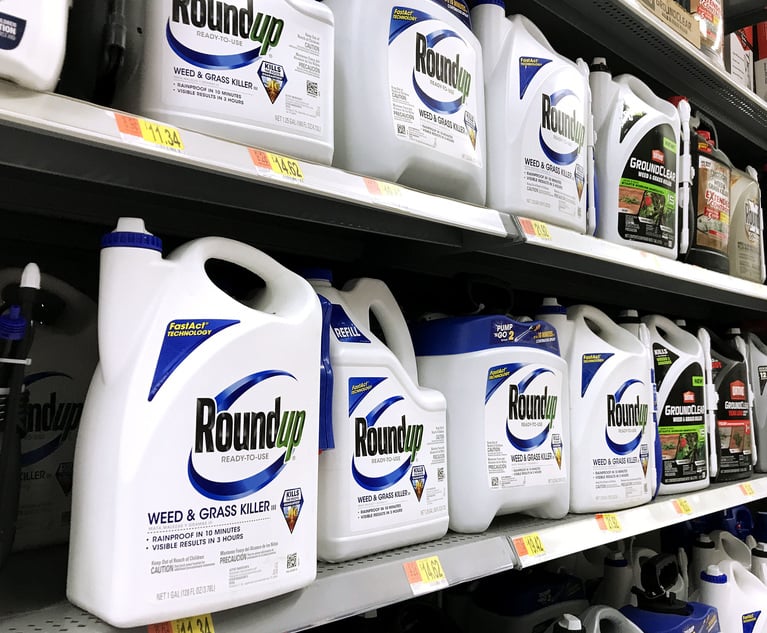 Joshua Cohan of Anapol Weiss.
Joshua Cohan of Anapol Weiss.Roundup: A (Weed) Killer in Our Own Backyard
Even though the Roundup litigation isn’t taking place in the Delaware Valley, it’s impact can be felt in our backyard.
August 09, 2019 at 11:33 AM
8 minute read
You’ve probably heard about Roundup, the world’s best-selling weed killer. Home improvement stores, big-box retailers, Amazon, and mom and pop shops all sell it. You’ve probably seen TV commercials showing how easy it is to use and how effective it is at killing weeds. Unfortunately, you probably have not heard that Roundup kills more than just weeds.
Monsanto has done little to protect the health and welfare of its consumers and has ignored studies showing the potential dangers of Roundup and its key chemical component, glyphosate. Nearly 14,000 consumers have filed lawsuits against the manufacturer of Roundup, Monsanto, an American agrochemical company. The majority of the plaintiffs who have filed claims against Monsanto developed non-Hodgkin’s lymphoma (NHL), or an NHL subtype, after using Roundup. Roundup users are alleging that Monsanto failed to warn them of the dangers of Roundup and that Roundup caused them to develop cancer. Consumers are filing new claims against Roundup every day.
The Roundup litigation is primarily based in California state and federal courts, and Missouri state court in St. Louis. Bayer, who purchased Monsanto last year for $63 billion, has been hit with three substantial verdicts in California, including a record-setting verdict of over $2 billion.
Even though the Roundup litigation isn’t taking place in the Delaware Valley, it’s impact can be felt in our backyard. Thousands of people throughout Pennsylvania, New Jersey and Delaware have been using Roundup for decades and many of the plaintiffs who have filed Roundup lawsuits are from this region. From at-home users who spray Roundup a few times a year to kill pesky weeds in the cracks of their driveways, to farmers and landscapers who use Roundup almost every day across hundreds or thousands of acres of crops, the lives of many in the region have been devastated due to a product that was only intended to target weeds.
Monsanto developed glyphosate to kill weeds in the early 1970s and began marketing and selling Roundup in 1974. Even though other herbicides on the market contain glyphosate, Roundup is particularly dangerous because of its combination of glyphosate and a surfactant, POEA, which causes Roundup to easily absorb into human skin.
Despite nearly 30 studies between 1980 and 2012 showing the dangers of glyphosate and Roundup, Roundup remains on the market and Monsanto has not added warnings to its labels. Monsanto, and now Bayer, insist that Roundup is safe for consumers to use. They claim that the studies, many of which are animal studies, do not replicate the actual conditions of consumers using Roundup and therefore cannot be used to show that Roundup causes cancer in humans. Instead of adequately funding its own studies to determine the full extent of the risk posed by Roundup, Monsanto has been accused of focusing its efforts on ghostwriting articles to change the public’s perception and federal regulators’ opinions of Roundup. The Environmental Protection Agency (EPA) has so far failed to get involved and neither prohibits the sale of Roundup nor requires Monsanto or Bayer to add proper warnings to the labels.
This inaction by Monsanto and the EPA stands in stark contrast to the stance taken by the World Health Organization’s International Agency for Research on Cancer, which classified glyphosate as a probable human carcinogen in 2015, as well as California’s designation of glyphosate as a cancer-causing chemical in 2017. Austria and Belgium are among more than two dozen countries that banned or restricted the use of products containing glyphosate. Some local governments in the United States have started taking action, with Los Angeles County recently banning county departments from using Roundup.
The evidence presented at the three Roundup trials has shown Monsanto knew about the dangers of Roundup and actively worked to conceal the risks from the public. There is a reason that all three juries who have heard and seen the evidence against Monsanto have returned enormous verdicts—because the evidence has proven to be overwhelming.
|Past Verdicts
The first Roundup trial in the country, Johnson v. Monsanto, was tried in San Francisco in California state court in 2018. The plaintiff, a former school district groundskeeper, was diagnosed with non-Hodgkin’s lymphoma after using Roundup. The jury awarded the plaintiff a $289 million verdict, including $250 million in punitive damages, after finding that Monsanto failed to warn consumers of the dangers of Roundup. Ultimately, the judge reduced the punitive damages award to $39.25 million, reducing the total verdict to $78 million. On appeal, Monsanto has asked the California Court of Appeals to vacate the verdict, arguing that there is no evidence that glyphosate causes cancer in humans.
In the first and only federal Roundup trial to date, Hardeman v. Monsanto, the jury returned an $80 million verdict for the plaintiff. The plaintiff used Roundup for decades on his 56-acre property, from the 1980s until 2012. He was eventually diagnosed with B-Cell non-Hodgkin’s lymphoma. After a month-long bifurcated trial, the jury found Monsanto liable for negligence and design defect. The jury also found that Monsanto failed to warn the plaintiff that Roundup could cause cancer and that Roundup was a substantial factor in causing the plaintiff’s NHL. The verdict included $75 million in punitive damages. However, U.S. District Judge Vince Chhabria recently reduced the punitive damages award to $25 million.
In the most recent case to go to trial, Pilliod v. Monsanto, a California state jury handed Monsanto its third consecutive loss after a five-week trial. The jury returned a $2.055 billion verdict in favor of the plaintiffs for failing to warn that Roundup causes cancer. The plaintiffs, a husband and wife, had both been using Roundup on their California property since the 1970s. They were both diagnosed with non-Hodgkin’s lymphoma after they began using Roundup. The verdict included $55 million in compensatory damages and $2 billion in punitive damages. It is anticipated that Monsanto will appeal this latest verdict as well.
|What’s Next
All of the Roundup trials to date have been in California, but that will soon be changing. Gordon v. Monsanto is scheduled to start trial in Monsanto’s hometown, St. Louis, Missouri, Aug. 19. After Gordon, another Roundup trial is scheduled in St. Louis in September. St. Louis has long been viewed as a favorable venue for Roundup plaintiffs due to a history of major verdicts against large corporations. But with Monsanto’s strong ties to the St. Louis community, it’s possible a St. Louis jury might be more inclined to side with Monsanto.
Monsanto and Bayer have vigorously defended Roundup as being safe for use and have been unwilling to consider settling the nearly 14,000 pending Roundup lawsuits. While it has appeared that this litigation would continue for years due to Monsanto and Bayer’s hard-line approach, the tide has recently begun to shift, and it now appears that an end could be coming sooner than anticipated. Along with the three major plaintiff victories that have surely caused Monsanto and Bayer to reconsider their approach, the judge overseeing the federal court litigation in California recently hired a mediator, Ken Feinberg, to conduct mandated settlement talks. Bayer is also facing disgruntled shareholders who would like to move on and not have the uncertainty of this litigation hanging over the company.
If the first three verdicts are any indication, Monsanto, and now Bayer, will continue to face a legal and financial onslaught arising out of its Roundup sales. Continued victories by the plaintiffs should force Bayer to update its Roundup warning labels, or to possibly pull the product from the shelves altogether. Additional plaintiffs’ verdicts, and the greater public awareness that would follow, could also force the EPA to take action. For those who have already developed non-Hodgkin’s lymphoma after using Roundup, this litigation will hopefully get them the compensation they deserve. For everyone else, this litigation should be a wake-up call that Roundup kills more than just weeds.
Joshua Cohan is an associate at Anapol Weiss and is a member of the firm’s environmental and toxic tort team. Cohan currently handles Roundup and PFAS water contamination cases. His practice also involves pharmaceutical and other mass tort litigation. He can be reached via email at [email protected].
This content has been archived. It is available through our partners, LexisNexis® and Bloomberg Law.
To view this content, please continue to their sites.
Not a Lexis Subscriber?
Subscribe Now
Not a Bloomberg Law Subscriber?
Subscribe Now
NOT FOR REPRINT
© 2024 ALM Global, LLC, All Rights Reserved. Request academic re-use from www.copyright.com. All other uses, submit a request to [email protected]. For more information visit Asset & Logo Licensing.
You Might Like
View All
Monsanto Scores 2nd Phila. Roundup Verdict, but Fails to Stop Impending Trial
3 minute read
Pa. Appeals Court Shuts Down Bid for Clarity Amid 'Mallory' Uncertainty
4 minute read
Phila. Judge Upholds Roundup Defense Verdict—and the Rulings That Helped Monsanto Win
4 minute read
Upcoming Phila. Roundup Trial Canceled After Judge Knocks Out Most of Plaintiffs' Claims
3 minute readTrending Stories
- 1Judge Denies Sean Combs Third Bail Bid, Citing Community Safety
- 2Republican FTC Commissioner: 'The Time for Rulemaking by the Biden-Harris FTC Is Over'
- 3NY Appellate Panel Cites Student's Disciplinary History While Sending Negligence Claim Against School District to Trial
- 4A Meta DIG and Its Nvidia Implications
- 5Deception or Coercion? California Supreme Court Grants Review in Jailhouse Confession Case
Who Got The Work
Michael G. Bongiorno, Andrew Scott Dulberg and Elizabeth E. Driscoll from Wilmer Cutler Pickering Hale and Dorr have stepped in to represent Symbotic Inc., an A.I.-enabled technology platform that focuses on increasing supply chain efficiency, and other defendants in a pending shareholder derivative lawsuit. The case, filed Oct. 2 in Massachusetts District Court by the Brown Law Firm on behalf of Stephen Austen, accuses certain officers and directors of misleading investors in regard to Symbotic's potential for margin growth by failing to disclose that the company was not equipped to timely deploy its systems or manage expenses through project delays. The case, assigned to U.S. District Judge Nathaniel M. Gorton, is 1:24-cv-12522, Austen v. Cohen et al.
Who Got The Work
Edmund Polubinski and Marie Killmond of Davis Polk & Wardwell have entered appearances for data platform software development company MongoDB and other defendants in a pending shareholder derivative lawsuit. The action, filed Oct. 7 in New York Southern District Court by the Brown Law Firm, accuses the company's directors and/or officers of falsely expressing confidence in the company’s restructuring of its sales incentive plan and downplaying the severity of decreases in its upfront commitments. The case is 1:24-cv-07594, Roy v. Ittycheria et al.
Who Got The Work
Amy O. Bruchs and Kurt F. Ellison of Michael Best & Friedrich have entered appearances for Epic Systems Corp. in a pending employment discrimination lawsuit. The suit was filed Sept. 7 in Wisconsin Western District Court by Levine Eisberner LLC and Siri & Glimstad on behalf of a project manager who claims that he was wrongfully terminated after applying for a religious exemption to the defendant's COVID-19 vaccine mandate. The case, assigned to U.S. Magistrate Judge Anita Marie Boor, is 3:24-cv-00630, Secker, Nathan v. Epic Systems Corporation.
Who Got The Work
David X. Sullivan, Thomas J. Finn and Gregory A. Hall from McCarter & English have entered appearances for Sunrun Installation Services in a pending civil rights lawsuit. The complaint was filed Sept. 4 in Connecticut District Court by attorney Robert M. Berke on behalf of former employee George Edward Steins, who was arrested and charged with employing an unregistered home improvement salesperson. The complaint alleges that had Sunrun informed the Connecticut Department of Consumer Protection that the plaintiff's employment had ended in 2017 and that he no longer held Sunrun's home improvement contractor license, he would not have been hit with charges, which were dismissed in May 2024. The case, assigned to U.S. District Judge Jeffrey A. Meyer, is 3:24-cv-01423, Steins v. Sunrun, Inc. et al.
Who Got The Work
Greenberg Traurig shareholder Joshua L. Raskin has entered an appearance for boohoo.com UK Ltd. in a pending patent infringement lawsuit. The suit, filed Sept. 3 in Texas Eastern District Court by Rozier Hardt McDonough on behalf of Alto Dynamics, asserts five patents related to an online shopping platform. The case, assigned to U.S. District Judge Rodney Gilstrap, is 2:24-cv-00719, Alto Dynamics, LLC v. boohoo.com UK Limited.
Featured Firms
Law Offices of Gary Martin Hays & Associates, P.C.
(470) 294-1674
Law Offices of Mark E. Salomone
(857) 444-6468
Smith & Hassler
(713) 739-1250





